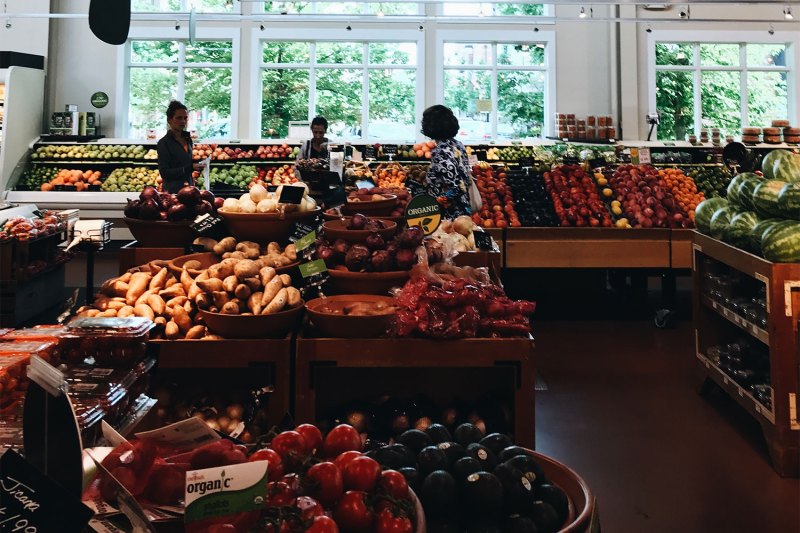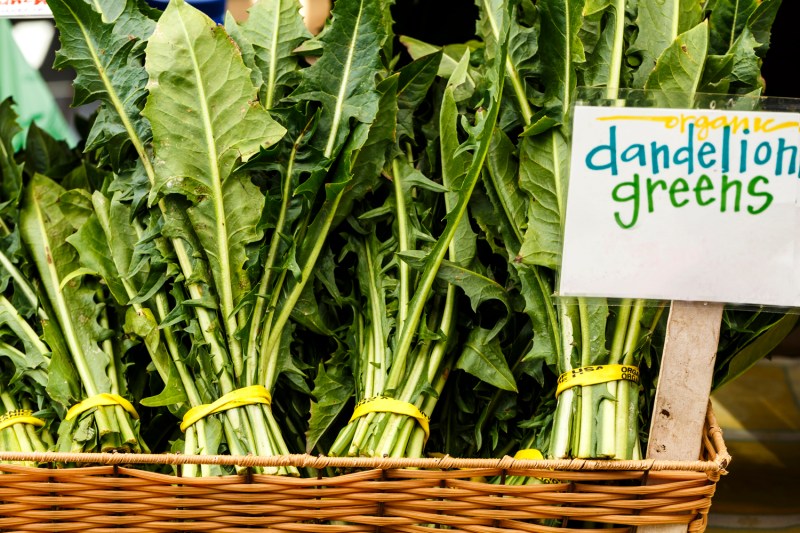In case you haven’t heard, things are expensive right now. Between the bear markets, labor shortages, and climate change’s major impact on agriculture, it’s simply a spendy time to be getting by. But you gotta eat, and we’re here to help you do so while saving a little money on your grocery bill en route.
While delivery options are handy and patronizing your local eateries are always advised, sometimes you have to hunker down and do things on a budget. The best way to do that, while feeding you and yours, is to shop sensibly at your local grocery store. You don’t have to be quite as regimented as your parents when you reach for your reusable bags, but a few tips can really help you out, especially as we navigate this unruly economy.

Here are eight tips to trim your grocery bill down as inflation continues to make everything way too expensive.
1. Shop Seasonally
Simply put, it takes more resources to produce a banana or sweet potato when it’s not naturally in season. That extra effort rubs off in the form of higher prices for you, the consumer. Do yourself a favor and find a proper produce calendar and stick to it as we enter the thick of the growing season. You’ll notice superior, fresher flavors as well as lower costs.
Geography should be tied to seasonality as well, at least as much as possible. In other words, you can probably skip the pineapple if you don’t live in Hawaii and familiarize yourself with what’s happening right in your own backyard. You’ll likely run into a new fruit or vegetable that’s less expensive with about the same nutritional might.
2. Buy Bulk Booze

Cutting out alcohol can save you a lot of dough, even if you replace it with something like sparkling water. If you wish to keep imbibing, bulk up your stash. If you like wine, find a boxed or canned version you like and stock up (wine is famous for offering bulk discounts). Prefer beer? Get it by the case directly from your favorite local producer.
Cocktail lovers are encouraged to try a lower-tier version of their favorite vodka, gin, whiskey, or rum. You’ll be amazed by how fresh citrus and good mixers can compensate for a less expensive spirit, and still save you some money overall. Oh, and if you live in a state with a solid recycling program, hold on to those cans and bottles and get your refund.
3. Grow Your Own
If you can, grow your own food. Even if you just plant a few choice crops (think tomatoes, cucumbers, carrots, and beans), you’ll soon have a fresh and tasty accent to most meals. If you lack the yard space for such an endeavor, consider growing indoors, even if it’s something as seemingly small as an herb garden on a windowsill or some potatoes in the basement. Microgreens are a great option if space is limited, as are some peppers, onions, and types of salad greens.
4. Seek Out Farmers Markets

For produce and specialty items, a good farmers market can be your best friend. Often, the cost is comparable, if not cheaper, thanks to distribution and transit fees tied into things. Better, you’ll likely be supporting a local business and be treated to the freshest, often organic ingredients available, which also happen to be the healthiest.
5. Eat Less Meat
Meat prices are on the rise, with beef increasing in cost close to 20% in some places. Similar hikes have affected poultry. Eating less meat is a great way to save some money, especially now with more plant-based options available. Also, keep in mind great substitutes like tempeh, tofu, lentils, chickpeas, jackfruit, nuts, and more. You’ll not only be doing your wallet a favor, but the environment as well, not to mention your own health.
6. Get Some Versatile Game Changers

It’s amazing what having a few staples at your disposal can do to your food game at home. With a bottle or two of Japanese Barbecue Sauce, your stir-fries, grilled meats and vegetables, rice dishes, and more are set to be elevated across the board. This goes for things like spice blends, beans, canned tuna, and greens, such as arugula, which you can use in countless recipes.
Also, consider clever trade-offs. If you love olive oil, think about getting a nice bottle of it and then swapping out more expensive meats or pasta sauce additions. Often, a good olive oil alone can change a meal, whether you’re throwing in on bucatini or using it for a crusty loaf dipping.
7. Plan Your Meals
When you plan your meals out for a week or two at a time, you set yourself up to buy a lot of groceries, but in a smarter fashion. You know exactly what you need, meaning less of a chance to give in to impulses while wandering the aisles.
Create a bona fide shopping list and stick to it tightly, taking advantage of promotions and coupons. Entering a supermarket with no apparent plan almost always leads to higher grocery bills, as you’re making things up on the spot and moving about the store without any real direction.
8. Look Into Loyalty
If you have a go-to spot for your groceries and it offers a membership program, it might be worth considering. Often, these stores reward you for returning and giving them more business. Just be sure to comb through the fine print or seek out reviews of the loyalty programs either from friends who have joined up or online.


